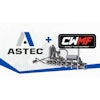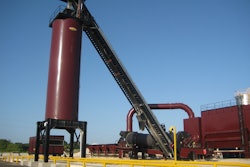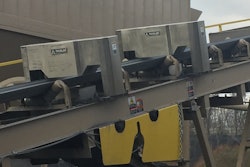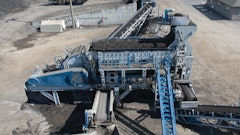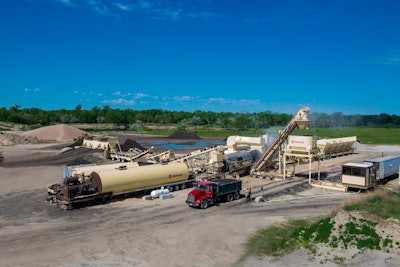
When it came time to replace an older Astec/CEI portable plant in 2016, it was an easy decision for Paulsen, Inc. to do so with a state-of-the-art Astec/Dillman 400 TPH 8-ft. by 38-ft. Double Barrel Drum Mixer powered by a Whisper-Jet 100 MBTU per hour gas/#2 oil burner.
“Paulsen operates two portable plants that give them the advantage of moving wherever the work is,” Ken Mayo, Astec regional sales manager says. “They’ve been very satisfied with the two Astec portable plants they were using and decided it made sense to stick with what’s been performing well for them. The 400 TPH portable plant is ideal for the size of jobs Paulsen produces and they tend to move a portable plant six to ten times a year. They decided to trade in the old plant, replacing all the components. Basically, they wanted to mirror their existing plant with similar components and gain any technology enhancements by replacing everything.”
As Mayo notes, Astec and Paulsen, a family-owned business now led by the third generation, have enjoyed a close relationship. “We’ve been doing business with them for a long time and that relationship enable us to know what works best for them and how they like to operate.” Mayo says.
Relationship, technology benefits
Paulsen’s six decades of asphalt experience has demonstrated the need for quality equipment and excellent support. From major paving projects on I-80 and primary highways, to city streets and parking lots, Paulsen has built a strong reputation for quality, owner satisfaction and lasting relationships.
For Kane Nordmeyer, equipment manager for Paulsen, that relationship and the ability to leverage new technology has been crucial in building a positive partnership with Astec and a successful paving business for Paulsen.
“We’ve been able to rely on the Astec brand and the customer service behind the brand to build our business,” Nordmeyer says. “With this new plant acquisition, we were able to upgrade with a much more user-friendly facility. The V-Pac Stack Temperature Control System (equipped with a set of V-Flights and Variable Frequency Drive) automatically adjusts based on inlet and outlet temperatures to maintain mix quality production temperature and save on operator fatigue.”
As Nordmeyer points out, that feature has proved important for Paulsen when producing different mix designs that meet different state road agency requirements. And while Paulsen’s two paving crews and two plants work primarily in Nebraska, bids occasionally take them out of state.
“Each state has its own guidelines based on the available aggregate. In Nebraska, we use crushed river rock to get the angularity required to provide the highway abrasion agencies specify for a surface course,” Nordmeyer states. “If we were to take this plant to Oklahoma, we would be able to program the V-Pac to maintain mix temperature based on the aggregate available there.”
But for Paulsen, the two portable plants are used predominantly on state highway projects west of Grand Island, NE.
“Most of our projects are in the 35,000 to 50,000-ton range and having automatic temperature control makes it easy for a plant operator to efficiently maintain production throughout the duration of the project,” Nordmeyer says.
Ninety-five percent of Paulsen’s asphalt production supports its two paving crews. When the new plant was brought on line it took most of the 2016 paving season to bring the plant up to full production.
Additional components that support the drum and V-Pac technology advantage include a five-bin cold feed system, a 67,000 CFM Horizontal Cyclone, a 69,685 CFM Express Baghouse, a portable self-erecting surge bin, a portable power house with continuous mix blending controls, a Weigh Mate 2000 Truck Loadout and Management System, and Heatec 30,000-gallon portable asphalt tank.
“With every new plant you’ll always have a few glitches to work out, and that was the case with this plant as it relates to the efficiency of the burner fuel and aggregate loss,” he notes. “We were able to produce between 190,000 and 200,000 tons with the plant in 2016, and more during the 2017 season we’re wrapping up.”
More RAP mill and fills
Both portable plants have performed well with mix designs incorporating reclaimed asphalt mix content. In Nebraska, mixes with 50-60 percent RAP can be used in base courses and shoulder work. Surface course mixes are limited to 35-45 percent.
“Most of our projects are mill and fill, where we’re just replacing the surface course,” Nordmeyer says. “It’s pretty common for us to mill right in front of the paving operation, with our truck drivers delivering new mix to the paving crew, then taking on a load of milled material, hauling it back to our plant and then taking on another load of new mix before returning to the jobsite.”
As Nordmeyer explains, the Nebraska Department of Roads has been pushing to increase RAP content to expand budgets to complete more work.
“There’s definitely been more jobs let by the state in recent years and the state realizes the existing pavement milled on a project contains valuable modified asphalt binders and aggregate that should be used to resurface a project,” he says.
With the new plant along with the other Astec portable plant that was put into service in 2010, Nordmeyer is confident increased RAP will continue to lead to more work.
“Our other older plant, which has undergone some modifications over the years, ran at 400-450 TPH this past season and I’m certain the newer plant can do the same if we need it to,” Nordmeyer states. “We plan to keep these plants busy in the years ahead; and the design and quality, along with customer support, should allow us to do that.”

